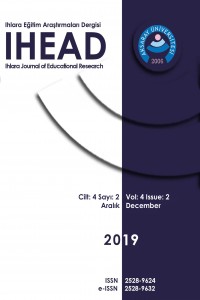ÜSTÜN YETENEKLİ ÖĞRENCİLERİN MÜKEMMELİYETÇİLİK DÜZEYLERİ VE AİLELERİNİN ÇOCUK YETİŞTİRME TUTUMLARINA YÖNELİK ALGILARI ARASINDAKİ İLİŞKİ
Abstract
Bu çalışmada üstün yetenekli
öğrencilerin ailelerinin çocuk yetiştirme tutumlarının söz konusu çocukların
mükemmeliyetçiliği üzerinde herhangi bir etkisinin bulunup bulunmadığı
araştırılmıştır. Bunun için çocuklardan Ebeveynlik Tutumları Ölçeği ve Çok
Boyutlu Mükemmeliyetçilik Ölçeğini doldurmaları istenmiştir. Aile tutum
ölçeğinin çocuklar tarafından doldurulması, çocukların mevcut algılarına göre
mükemmeliyetçilik davranışının şekillenmesi açısından önemlidir. Verilerin
analizinde Pearson Çarpım Moment Korelâsyon katsayısı hesaplanmıştır. Pearson
Çarpım Moment Korelâsyon katsayıları incelendiğinde ise özellikle babanın
kabul/ilgi tutumuna yönelik algının çocuklarda mükemmeliyetçilik düzeylerini
istatistiksel olarak anlamlı düzeyde azalttığı görülmüştür. Anneye yönelik
algılar incelendiğinde ise annenin sıkı denetim/kontrol tutumuna yönelik
algısının çocuklarda istatistiksel olarak mükemmeliyetçilik düzeylerini
artırdığı görülmüştür. Ayrıca değişkenler açısından mükemmeliyetçilik düzeyleri
arasında anlamlı bir farklılaşma olup olmadığına bakmak için bağımsız örneklem
t testi ve ANOVA yapılmıştır. Analizler sonucunda değişkenler bağlamında
istatistiksel olarak anlamlı bir farklılaşma olmadığı görülmüştür.
Keywords
References
- Antony. M. M. ve Swinson. R. P. (2000). Mükemmeliyetçilik Dost Sandığımız Düşman. (Çev. Aslı Açıkgöz). İstanbul: Kuraldışı Yayıncılık.
- Burka. J. B.. & Yuen. L. M. (2007). Procrastination: Why you do it. what to do about it now. Hachette UK.
- Burns. D. D. (1980). The perfectionist’s script for self-defeat. Psychology today. 14(6). 34-52.
- Chan. D. W. (2008). Perfectionism and goal orientations among Chinese gifted students in Hong Kong. Roeper Review. 31(1). 9-17.
- Dinç. Yasemin. (2001). Predictive Role of Perfectionism on Depressive Symptoms and Anger: Negative Life Events as The Moderator. Yayımlanmamış yüksek lisans tezi. Orta Doğu Teknik Üniversitesi Sosyal Bilimler Enstitüsü. Ankara.
- Flett. G. L.. Hewitt. P. L.. Oliver. J. M.. and Macdonald. S. (2002). Perfectionism in Children and Their Parents: A Developmental Analysis. In G. L. Flett & P. L. Hewitt (Eds.). Perfectionism: Theory. Research. and Treatment (pp. 89–132). Washington DC: American Psychological Association.
- Frost. R. O.. Marten. P.. Lahart. C.. & Rosenblate. R. (1990). The dimensions of perfectionism. Cognitive therapy and research. 14(5). 449-468.
- Geçtan. E. (1988). Çağdaş Yaşam Ve Normaldışı Davranışlar. İstanbul: Remzi Kitabevi.
- Hamachek. D. E. (1978). Psychodynamics of normal and neurotic perfectionism. Psychology. 15. 27-33.
- Karasar. N. (2016). Bilimsel araştırma yöntemi kavramlar-ilkeler-teknikler. Ankara: Nobel.
- Kenney Benson. G. A.. & Pomerantz. E. M. (2005). The role of mothers' use of control in children's perfectionism: Implications for the development of children's depressive symptoms. Journal of Personality. 73(1). 23-46.
- Kline. B. E.. & Short. E. B. (1991). Changes in emotional resilience: Gifted adolescent females. Roeper Review. 13(3). 118-121.
- Kramer. H. J. (1987). Anxiety. perfectionism and attributions for failure in gifted and non-gifted junior high school students. Yayınlanmamış Doktora Tezi. Catholic University of America.
- Ogurlu. Ü.. Yalın. H. S.. ve Yavuz Birben. F. (2015). Üstün Yetenekli Çocukların Mükemmeliyetçilik Özelliklerinin Aile Tutumu İle İlişkisi. Turkish Studies. 10(S 7). 751-764.
- Özensel. E. (2004). Türk toplumunda çocuğun yetiştirilmesinde annenin rolü: Konya ili örneği. Değerler Eğitimi Dergisi. 2(6). 77-96.
- Rice, K. G., Lopez, F. G., & Vergara, D. (2005). Parental/social influences on perfectionism and adult attachment orientations. Journal of Social and Clinical Psychology, 24(4), 580-605.
- Roberts. S. M.. & Lovett. S. B. (1994). Examining the “F” in gifted: Academically gifted adolescents' physiological and affective responses to scholastic failure. Journal for the Education of the Gifted. 17(3). 241-259.
- Schuler. P. A. (1997). Characteristics and Perceptions of Perfectionism in Gifted Adolescents in a Rural School Environment. Yayınlanmamış Doktora Tezi. University of Connecticut.
- Schuler. P.A.(2002). Perfectionism in Gifted Children Adolescent: Neihart. M. and N. A. f. G. Children. the Social and emotianal development of gifted children: what do we know?. Prufrocks Press (TX).
- Silverman. L. K. (1993). Counseling the gifted and talented. Love Publishing Co.. 1777 South Bellaire St.. Denver. CO 80222.
- Silverman. L. K. (1999). Perfectionism. Gifted Education International. 13(3). 216-225.
- Stoeber. J.. & Stoeber. F. S. (2009). Domains of perfectionism: Prevalence and relationships with perfectionism. gender. age. and satisfaction with life. Personality and Individual Differences. 46(4). 530-535.
- Tire. Y. (2011). Ön ergenlerde olumlu ve olumsuz mükemmeliyetçilik ile algılanan anne baba tutumları arasındaki ilişkinin incelenmesi. Yayımlanmamış Yüksek Lisans Tezi. Çukurova Üniversitesi. Adana. Türkiye.
- Yavuzer. H. (2003). Çocuk Psikolojisi. İstanbul: Altın Kitaplar Yayınevi.
Details
| Primary Language | Turkish |
|---|---|
| Subjects | Studies on Education |
| Journal Section | Research Article |
| Authors | |
| Publication Date | December 31, 2019 |
| Submission Date | March 8, 2019 |
| Published in Issue | Year 2019 Volume: 4 Issue: 2 |
Dear Colleagues,
We are very pleased to announce that the latest issue of IHEAD (Vol. 10- Iss. 1) has been released. We kindly want to express our speacial thanks to the editorial board members, reviewers, and authors for their invaluable contribution to this issue. Also, we are delighted to announce that the next issue (Vol. 10- Iss. 2) of the IHEAD will be available online in December, 2025. As of January, 2024, IHEAD has been accepting submissions in English along with Turkish. Handling your papers within the scope education for the next issue will be a great pleasure for us. Many thanks in advance for your contributions.
Editorial Board
Ihlara Journal of Educational Research (IHEAD) by Education Faculty of Aksaray University is licensed under CC BY-NC-SA 4.0. To view a copy of this license,visit http://creativecommons.org/licenses/by-nc-sa/4.0/
Ihlara Journal Educational Research (IHEAD) uses iThenticate, one the most trusted plagiarism checkers by the world’s top researchers, publishers, and scholars.

Ihlara Journal Educational Research (IHEAD) is an open-access journal.


